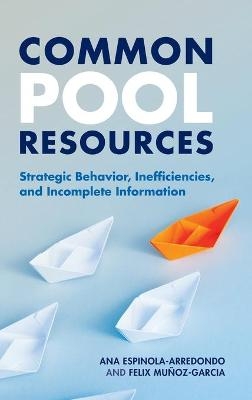
Common Pool Resources
Strategic Behavior, Inefficiencies, and Incomplete Information
Seiten
2021
Cambridge University Press (Verlag)
978-1-108-83103-1 (ISBN)
Cambridge University Press (Verlag)
978-1-108-83103-1 (ISBN)
This textbook uses game theory to explain common resource management. It is intended for students in economics, business, public policy, and other social sciences, both at the undergraduate and graduate levels, taking courses in natural resource economics and management, or in environmental economics.
Common Pool Resources include, for instance, fishing grounds, irrigation systems, forests and the atmosphere. Now more than ever, how we responsibly share and use those goods is a vital issue. This textbook introduces students of economics, business and policy studies to the key issues in the field. It uses a game-theory approach to help readers understand the mathematical representation of how to find equilibrium behavior in CPRs, how to identify the socially optimal appropriation, and how to measure the inefficiencies that arise. Algebra and calculus steps are clearly explained, so students can more easily reproduce the analysis and apply it in their own research. Finally, the book also summarizes experimental studies that tested theoretical results in controlled environments, introducing readers to a literature that has expanded over the last decades, and provides references for further reading.
Common Pool Resources include, for instance, fishing grounds, irrigation systems, forests and the atmosphere. Now more than ever, how we responsibly share and use those goods is a vital issue. This textbook introduces students of economics, business and policy studies to the key issues in the field. It uses a game-theory approach to help readers understand the mathematical representation of how to find equilibrium behavior in CPRs, how to identify the socially optimal appropriation, and how to measure the inefficiencies that arise. Algebra and calculus steps are clearly explained, so students can more easily reproduce the analysis and apply it in their own research. Finally, the book also summarizes experimental studies that tested theoretical results in controlled environments, introducing readers to a literature that has expanded over the last decades, and provides references for further reading.
Ana Espinola-Arredondo is a Professor in the School of Economic Sciences, Washington State University. Felix Muñoz-Garcia is a Professor in the School of Economic Sciences, Washington State University.
Preface; 1. Introduction; 2. Common pool resources in a static setting; 3. Common pool resources in a dynamic setting; 4. Entry deterrence in the commons; 5. Repeated interaction in the commons; 6. Commons under incomplete information; 7. Signaling in the commons; Appendix A: game theory tools; Appendix B: solutions of selected end-of-chapter exercises.
| Erscheinungsdatum | 11.10.2021 |
|---|---|
| Zusatzinfo | Worked examples or Exercises |
| Verlagsort | Cambridge |
| Sprache | englisch |
| Maße | 158 x 235 mm |
| Gewicht | 480 g |
| Themenwelt | Recht / Steuern ► EU / Internationales Recht |
| Recht / Steuern ► Öffentliches Recht ► Umweltrecht | |
| Wirtschaft ► Volkswirtschaftslehre | |
| ISBN-10 | 1-108-83103-6 / 1108831036 |
| ISBN-13 | 978-1-108-83103-1 / 9781108831031 |
| Zustand | Neuware |
| Haben Sie eine Frage zum Produkt? |
Mehr entdecken
aus dem Bereich
aus dem Bereich
wichtige Gesetze und Verordnungen zum Schutz von Umwelt und Klima
Buch | Softcover (2024)
dtv Verlagsgesellschaft
21,90 €
mit Verordnungen, Verpackungsgesetz, Elektro- und …
Buch | Softcover (2024)
dtv Verlagsgesellschaft
19,90 €


